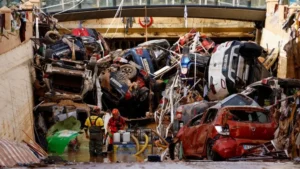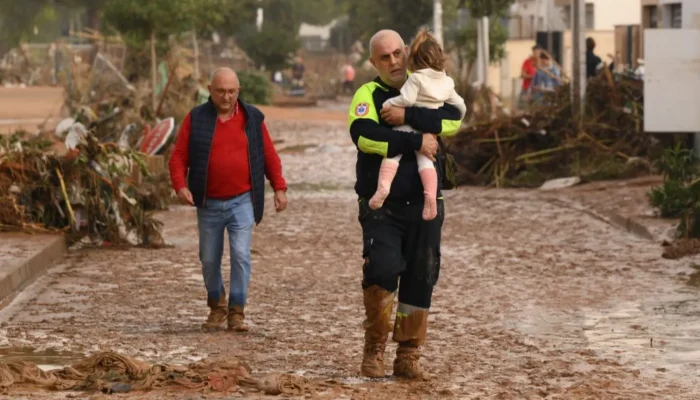Spain’s Valencia region is facing a devastating humanitarian and environmental crisis after unprecedented flooding left entire communities in ruin. Over 200 lives have been lost, countless homes and businesses destroyed, and people cut off from vital resources like food, water, and electricity. Prime Minister Pedro Sánchez has mobilised an additional 10,000 troops and police officers to aid relief efforts. However, as frustration mounts over the response time and lack of early warnings, the government’s actions are under intense scrutiny.
A Record-Breaking Mobilization Amidst Mounting Casualties
The flooding began after heavy rains on Monday and is among the worst Europe has witnessed in decades. Bridges have collapsed, roads are impassable, and entire towns are buried under thick mud, cutting off access to essential services. According to Sánchez, the deployment of troops and police represents Spain’s largest-ever peacetime mobilisation. The crisis has highlighted not only the vulnerability of these communities but also the urgent need for faster and more organised disaster response systems.
As authorities continue their work, the death toll is expected to rise. Amidst the chaos, over 1,700 soldiers have been deployed to rescue efforts, many of whom are focused on pumping water out of underground tunnels and parking structures where people may still be trapped. Sánchez acknowledged the gravity of the situation, admitting that “the response that is being given is not enough” and vowing that aid will reach every affected individual. However, even with the current rescue efforts, some residents feel abandoned and disillusioned with how authorities have handled the disaster.
Community Frustration and Criticism of Local Authorities
Valencian locals have expressed frustration with what they perceive as a delayed and inadequate response. Many feel that regional and federal authorities should have issued timely warnings about the impending danger, leaving people without the chance to evacuate. Juan González, a resident of Aldaia, criticised the lack of preventative action, pointing out that the area is historically prone to flash flooding. “It’s outrageous that our local government didn’t do anything about it, knowing this was coming,” he remarked.
The story of Amparo Andres, a small business owner who almost drowned as floodwaters rose in her shop, highlights the desperation many residents face. Having lost her business and home, Andres is disillusioned by what she feels is an ineffective response from the government. Similarly, Amparo Esteve, a resident of Paiporta—a town that has reported over 60 deaths—voiced her despair, saying, “No one is helping us. I’ve never been in a war, but this is what it seems like.” These voices represent a growing resentment among Valencians, who feel that local authorities failed them during their greatest need.

Massive Volunteer Efforts and Community Solidarity
Despite the challenges, the crisis has united citizens in a remarkable solidarity. Thousands of volunteers, primarily young people, have assisted with clean-up and relief efforts, organising via social media. On Saturday morning, 15,000 volunteers gathered at Valencia’s Ciutat de les Arts museum, ready to contribute to recovery efforts. Pedro Francisco, a 16-year-old volunteer, said, “We have to do whatever we can. It’s just terrible to see what has happened.”
This grassroots response has filled some gaps left by the authorities, demonstrating the strength of the local community in the face of adversity. While government support continues to ramp up, the efforts of volunteers have become a lifeline for many residents.
Moving Forward: Addressing Immediate Needs and Long-Term Change
In the coming days, Valencia’s residents and authorities will need to focus on immediate relief and long-term resilience. The government is working to restore essential services, with electricity returned to over 90% of homes and half of the damaged phone lines back in service. Additionally, 100 civil servants have been appointed to expedite the distribution of financial aid.
However, it’s essential that authorities learn from this experience to prevent future tragedies. Sánchez has pledged that the government will do “whatever it takes” to support affected communities, calling for national unity in this crisis. However, locals are demanding immediate assistance and structural changes that could prevent future floods from reaching such catastrophic levels.
The anger expressed by Oscar Martinez, a resident who waited for hours to volunteer, encapsulates the sentiments of many. “This was an avoidable tragedy. All the regional government needed to do was to give us the flood warnings in advance.” As Spain’s government and its citizens rally to restore Valencia, questions linger about how the nation can prepare better and respond faster to natural disasters of this scale.




